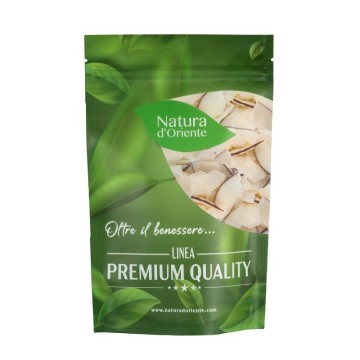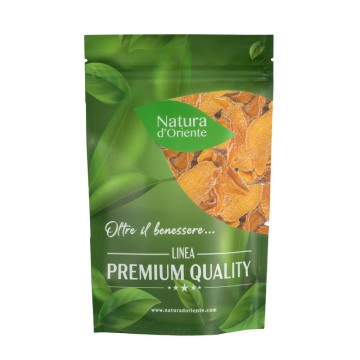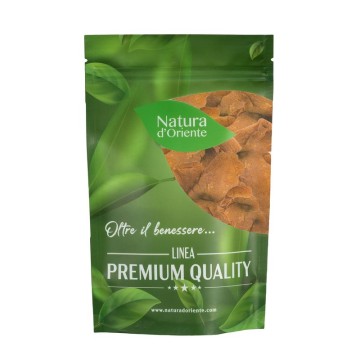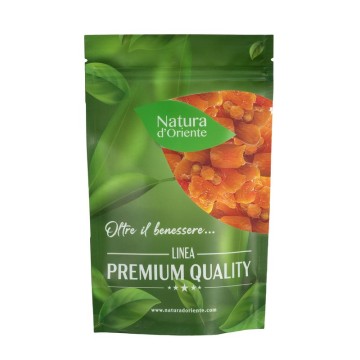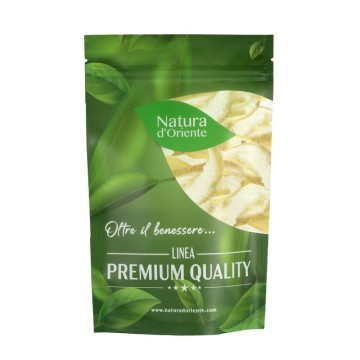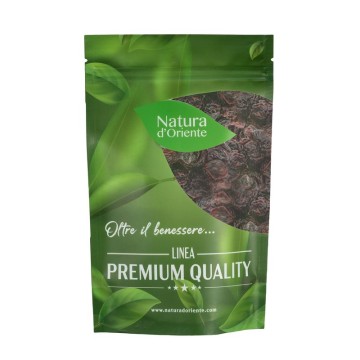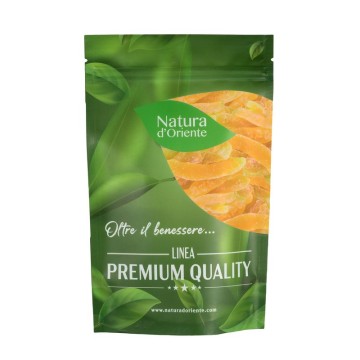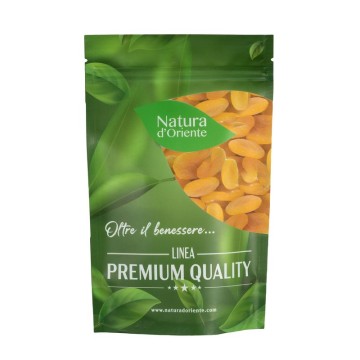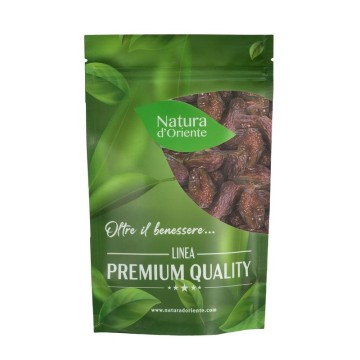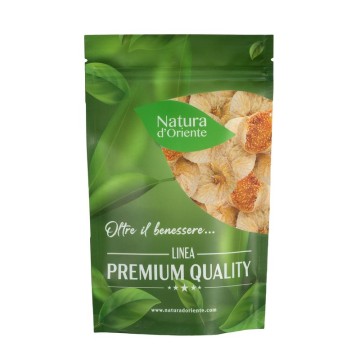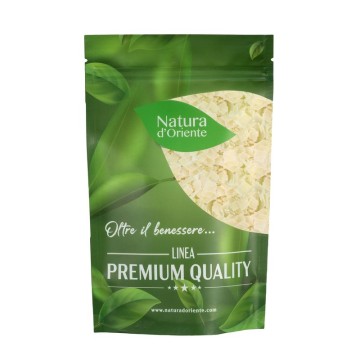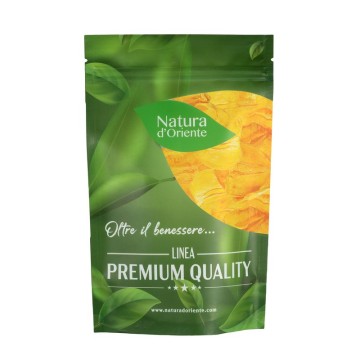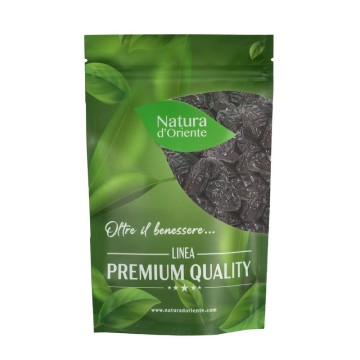Dehydrated ginger with icing sugar
We often talk about the benefits of ginger, which are also available to our body in the version of dried ginger. We know, in fact, that the nutritional composition of many fruits and vegetables can change during exposure to heat, boiling, freezing or dehydration. When it comes to ginger or ginger, we can rest assured that drying does not affect its biologically important chemical compounds, particularly if it is dehydrated ginger like all dehydrated fruit.
Dehydrated ginger with powdered sugar: properties and benefits
For many centuries, dried ginger has been regarded in traditional Chinese medicine as a cure-all for alleviating the symptoms of diseases, and improving human health. It is becoming more and more popular in recent years, both as an ingredient in recipes and herbal teas, and when it is made into soft dried ginger . Obviously, when we talk about dehydrated ginger with powdered sugar, we can immediately think of its taste, its spicy and warming effect which in the past was used to treat colds, indigestion, diarrhea, pain relief and from the hassles of rheumatism.
Today, we know better its chemical properties, and we can therefore take advantage of dehydrated ginger for our well-being. Two groups of polyphenols, called gingerols and shogaols, are responsible for the pungent taste of dehydrated or fresh ginger. At the same time, they show great antioxidant and anti-nausea properties, to stimulate digestion and increase stomach muscle tone.
Often dehydrated ginger remains sweeter on the palate but is used to soothe sore throats, to treat hoarseness and loss of voice when talking too much; or when cold air enters the lungs; to counteract the ailments of colds on the oropharyngeal system.
It is useful in limiting motion sickness (symptoms such as dizziness, nausea and regurgitation) or for the prevention of vomiting and stomach pain. Natural ginger has been used for centuries to treat nausea (antiemetic). This is because unsweetened dehydrated ginger energizes stomach functions and can stimulate appetite.
The substance contained in ginger called gingerol, in fact, can stimulate receptors in the gastric mucosa, improve gastrointestinal motility, promote gastrointestinal secretion, eliminate gas and improve digestion. Always acting as such, dehydrated ginger can also help in counteracting disorders related to the menstrual cycle.
A part of the ginger has purifying properties useful for digestion, so adding a little dehydrated or fresh ginger for cooking, you will get a spicy but also natural antiseptic effect.
Dried ginger is known not only for its exquisite taste, but also for its antioxidant benefits, thus protecting against oxidation and cellular aging. The gingerol present in ginger can create an antioxidant enzyme in the body, which inhibits free radicals with an effect considered even stronger than vitamin E.
According to some recent research, dehydrated ginger shows excellent antioxidant activity due to its higher content of polyphenols (antioxidant compounds). When the water is removed from the ginger during the drying process, the concentration of polyphenols increases and there is no risk of changing its biochemical composition with exposure to heat.
In addition, gingerol and the volatile oils contained in ginger can have a stimulating effect on the regularity of the vascular system, helping the blood to circulate more easily, and thus providing more oxygen to the brain and improving it.
Origins and History of cultivation
Originally from the East, this plant was known since ancient times in Traditional Chinese Medicine, in which ginger represents a plant of the category "herbs that warm the inside and keep away the cold". These herbs were often used for colds and for people who feel cold in their body. In the case of ginger, it is an edible aromatic plant in its part that looks like a root, the rhizome.

Its properties have always been appreciated as a food preservative, but sometimes magical properties were attributed to ginger; given that the antimicrobial active ingredients were exchanged with the "supernatural" qualities of food preservation - in addition to the medical properties recognized at the time.
This is why it was one of the first spices requested by Asia in the West, and it is thought that it was Alexander the Great who introduced it, and then went on to expand through the trade of the Greeks. Its spicy flavor has often been associated with aphrodisiac virtues, and in medieval England it was also thought to cure the plague. The name ginger, in fact, derives from the English word gingifer (today ginger), in turn derived from the ancient Sanskrit, in a word that meant horned root - due to its particular shape.
Today it is grown throughout the tropical and subtropical belt of the planet. After the rhizome has been harvested, it is cleaned to be used fresh or dried in the sun, and transformed into the powder sold as a spice. The version of sliced natural ginger, without fructose or added sugars, is in great demand.
Plant and Fruit
Zingiber officinale is a herbaceous plant of the Zingiberaceae family, which originates in the Far East, probably from Malaysia. In ancient times it was called gengiovo and is often found with its Anglo-Saxon name of ginger. The plant is a rhizomatous evergreen perennial, which means it has a fleshy and branched rhizome (underground shoot).
The rhizome gives life to several hollow stems, formed by leaves, and also to other stems with greenish-yellow inflorescences, and then the real small and white flowers. The bushes expand with growth, reaching up to half a meter in width and also in height. The fruit consists of a capsule divided into three parts, but it is woody and is not eaten.
Ginger is often grown as an indoor plant or in a home garden, the important thing is that there is a warm climate, which does not drop below 5 ° C. The part of the ginger that is used in the kitchen is the rhizome, as we have mentioned, with a spicy flavor perfect for flavoring dishes like a spice. The ginger rhizome is harvested when the plant has accumulated essential oil, usually during the cold season between January and February.
Sometimes the rhizomes of ginger are confused by some people with carobs, fruits that grow on the carob tree, an evergreen typical of the Mediterranean area.
Nutritional values of dehydrated ginger with powdered sugar
The rhizome of dried ginger has a good caloric content, like dried fruit, since they provide about 380 Kcal for every 100 grams. The most important active ingredients of the plant are the essential oil composed of zingiberene, the polyphenols, gingerols and shogaoli that make its flavor pungent, other resins and mucilages.
Considered among the various types of dehydrated fruit, even in reality it derives from the rhizome of the plant and not from the fruit, dried ginger or ginger contains among the polyphenols, some phenolic substances studied for their properties, the 6-gingerol which when is dried it turns into 6-shogaol.
Dehydration enhances the properties of fresh ginger, making it more pungent and beneficial. How to consume dehydrated ginger with powdered sugar in the kitchen or as a snack Dehydrated ginger comes from the rhizome, with a spicy flavor perfect for flavoring dishes like a spice; or as a fundamental ingredient for the preparation of desserts such as cakes or biscuits.
In the sliced dehydrated ginger version, it is also consumed as a hunger-breaker or energy snack. In fact, it can be used to create energy bars suitable for those who practice sports.
In the dehydrated version, ginger has a more pronounced flavor, which is why it is widely used as a spice in thin slices on some dishes. It is also added to yogurt, smoothies, vegetable milk, ice creams or to create dried fruit mixes, in some fruit salads where its aroma and pungent flavor do not disturb.
In Japanese cuisine, ginger is even served as a sweet and sour pickle with sashimi. In other oriental cuisines it is used to create soups and sauces, in the pulverized version.
Dehydrated ginger with powdered sugar: side effects and contraindications
There are no particular contraindications to taking dehydrated ginger, but we must keep in mind a possible intolerance to the food. Historically, due to its fluidifying properties, it was not recommended for people using anticoagulant drugs. As always for foods rich in sugar and dried, the calorie content is high and therefore excessive use should not be recommended for those suffering from diabetes. It should be used with caution during pregnancy or breastfeeding for this reason.
![]()
![]()

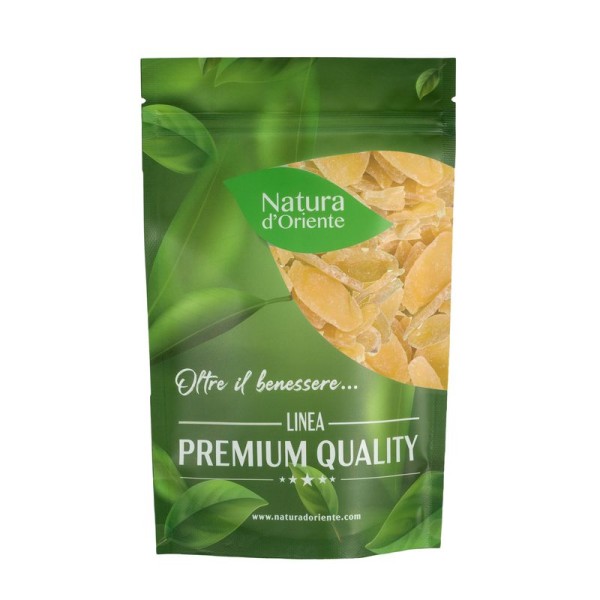









 No reward points for this product.
No reward points for this product.

